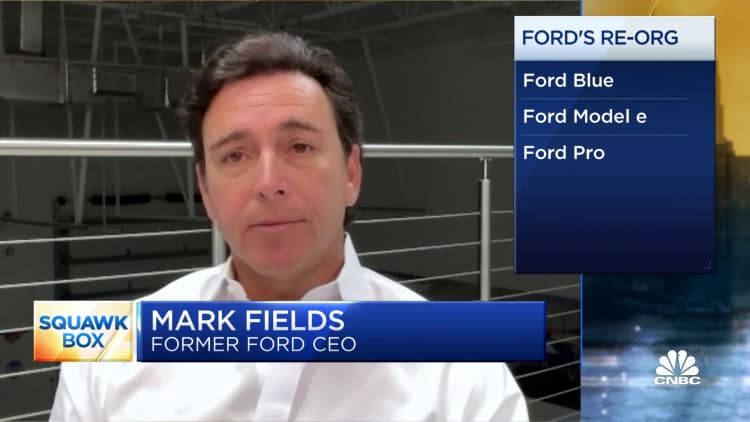Ford Motor said on Wednesday that it will separate — but not spin off — its electric vehicle business from its legacy autos operations.
Many Wall Street analysts and investors have been pressuring legacy automakers such as Ford to spin off their electric vehicle operations, in hopes of capturing a high valuation like those that investors have been awarding some EV start-ups.
While CEO Jim Farley and other Ford executives readily acknowledge that some separation between the company's EV efforts and its legacy internal-combustion-engine business makes sense, they argue that a full spin-off would have put Ford at a disadvantage to both old and new rivals.
"Today, our corporate structure is holding us back," Farley said. "It does not allow us to focus. We need the ICE business to be cash generating and serving [Ford's] iconic brands. We need our electric business, the digital business, to be about innovation. We cannot ask the team to do both at the same time."
Why didn't Ford just spin off its EV business?
The case for a spin-off is easy to see. In theory, a spin-off would allow the part of Ford that's likely to see significant bottom-line growth — the EV business — to win a valuation comparable to those of other pure-play EV makers.
Right now, analysts say, the likely lack of growth for Ford's mature ICE business is holding down the overall company's valuation. Morgan Stanley analyst Adam Jonas argued in a November note that ICE "de-adoption" could outpace Ford's ability to ramp up EV production, and that Ford would need to consider "nontraditional" actions, such as a spin-off, to attract the capital and talent needed to succeed with electric vehicles.
But Ford executives say that the company — and its investors — will be better off with its EV and ICE businesses under one roof, albeit with much more separation than the two have had until now.
Farley said Ford gains "leverage" from areas where the two organizations, together with the Ford Pro commercial-vehicle unit, can draw on each other's strengths.
""We are not going to create separate brands. We are not going to compete with each other," Farley said. "The magic in this is to focus both organizations on what they need to focus on, more than asking everyone to do everything like we do today … and to get that leverage between both organizations."
"If we spin this out one or both entities, or all three, we really risk that leverage."
Separating the units has advantages, up to a point
Ford's plan is to run its new EV unit, called Ford Model e, like a start-up – with lean, flexible teams, a culture of innovation, and the ability to create "clean-sheet" designs that don't necessarily draw on the existing Ford product lineup.
While Farley will be Model e's president, its day-to-day leadership will fall to Doug Field, a former Apple and Tesla executive.
Field said that unlike other EV start-ups, Model e has the advantage of an integrated relationship with a profitable legacy automaker — but it will also see advantages from the separation.
"We need a culture in some of these new technologies and for clean sheet EVs, the kind of culture that attracts the best technical talent," Field said. "We want the best people. I don't care if they come to work in bunny slippers, but we got to have the best people."

Making the EV business a standalone unit under the Ford umbrella will "absolutely" assist in attracting new talent, Field said.
"We do need a different way of working in a different environment and the flexibility to do things like remote work," he said. "That is part of Model e -- to give us access to the very best talent."
Ford doesn't need to raise capital for its EV plan
Some analysts have argued that a spin-off of Ford's EV unit would allow that business to take advantage of its new pure-play-EV valuation to raise capital at low cost. That capital could then be used to fund the company's ambitious future-product plan — or perhaps, to fund an even-more-ambitious plan.
But Ford executives say that the company's EV business plan doesn't require raising capital from outside the company. Simply put, the substantial profits that Ford earns from its ICE trucks and SUVs will be ample to fund the company EV plan.
Ford's cash machine is currently its $42 billion F-Series truck franchise, which has been the best-selling vehicle in the U.S. for decades.
Keeping both businesses in-house allows Ford to internally fund the expansion of EVs and other advanced technologies such as autonomous vehicles with profits from the traditional operations.
"We certainly looked at spin-offs but, No. 1, we can fund this ourselves," Farley said. "We don't need access to capital markets." Secondly, he said the company would lose synergies and leverage if one or the other was spun off.
A compromise that appeased Wall Street – for now
To some extent, Ford's restructuring plan is a compromise to appease those analysts and investors. It's separating the operations and providing greater transparency by breaking out their results by next year, while keeping the company whole — something that Farley believes is necessary to lower costs for both operations.
"This change is not about financial management of the company," Farley said. "This is about focus, capability, better products, better experience. That's how we're going to win as a company."
Investors supported the actions, sending shares up by 8.4% Wednesday to $18.10. The stock is down about 15% this year.
Analysts widely praised the split, but some still have hope that Ford will spin off the operations in the future.
"We note that as the BEV business matures, strategic options could reemerge later in the decade — much as multiindustrials continue to refine their portfolios," Barclays analyst Brian Johnson wrote Wednesday in an investor note.
Correction: Ford's shares closed up 8.4% to $18.10 on Wednesday. An earlier version misstated the price.



